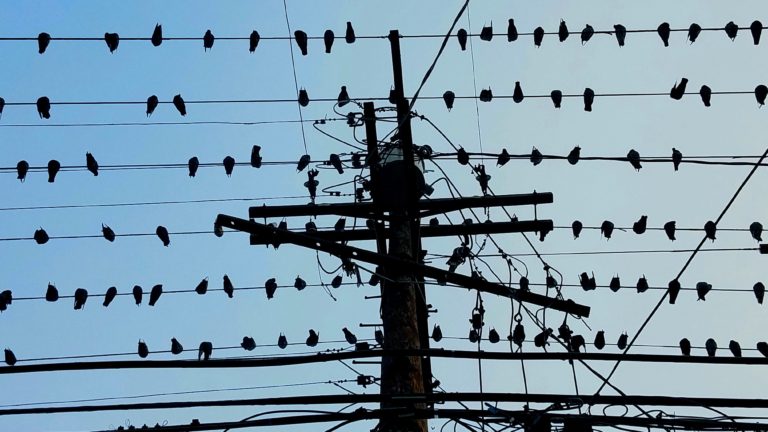Alice Landrum-Fiction
Jenny steered the car out of the vast Walmart lot to head west out of Moberly on Highway 24. Since...

ON THE EDGE
An arctic blast hit her face when Jenny walked into the dark to find her car. Frigid air pierced the sleeves of her thin red jacket. This sudden winter storm in late February would shrivel the white blossoms on the apple trees in northern Missouri.
Ten hours ago, Jenny grabbed a light jacket to throw over her sweater as she ran out the door. Her schedule left little time to take care of herself in the morning since she had to feed Stevie, stuff a tote bag with supplies, and drop her infant son off at the daycare center, before a twenty-mile drive to a job at Walmart.
When she left her apartment that morning, she missed the latest weather report. The weatherman had predicted that the temperature would be dropping to at least ten below zero. If she had listened to the news, maybe she’d have been better prepared with a warmer coat, hat, mittens, and boots when the wind chill dropped the temperature to minus seventeen degrees. By the time she reached her blue Honda and sat down on the cold, vinyl-covered seat, her body began to tremble. Her numb fingers could barely turn the starter. The twelve-year-old car had spots of rust on the hood and a dent on the right front fender, but last week she purchased a new battery, so the engine hummed immediately. The gas gauge registered only a quarter of a tank. Where had that gas gone? She had filled the tank just two days ago. Most likely, while she worked inside, a thief had siphoned gas from her car. Her heart started to race from anger and frustration, but she did not have time to report the loss.
Twenty minutes ago, the lady at the day care, Betty, called Jenny to tell her to come right away to pick up Stevie. Jenny decided to ignore the low gas tank. There was enough gas to get home. She could fill the gas tank tomorrow at the local station near her apartment.
Betty’s sharp voice echoed in Jenny’s head.
“I need you to pick up Stevie so I can get home to check the pipes. The other parents have already picked up their children. I’m the only adult here now.”
“Okay, I’ll come as soon as I talk to my boss.”
From their time together in high school, Jenny knew that Betty resented her for her popularity with the boys. When Jenny stood laughing near the lockers with the captain of the football team, Betty on passing would turn to give Jenny a sour look. Betty’s lank black hair and bushy eyebrows were a stark contrast to Jenny’s blonde curls. Betty often acted jealous and enjoyed showing her irritation with Jenny by cutting her off in classroom discussions or bumping her in the cafeteria. Jenny had never forgotten a shove by Betty that led to a spilled bowl of vegetable soup on her white sweater. After they finished high school and went off to separate places, Jenny didn’t see Betty that often, but when Betty opened the day care center, Jenny needed a place for Stevie while she worked since she lived alone without a husband or family nearby to help.
She felt so lucky to have this job with the health-care benefits and the work hours that let her pick up Stevie by 8 p.m., so she did not want to jeopardize her ability to keep her son at this day care only a mile from her apartment.
The manager, Rob, a tall man dressed in a red Walmart apron, stood behind a cash register at the entrance. When she approached him about leaving an hour early, he did not hesitate.
“No problem. This weather is getting worse by the minute.” They both looked around at the empty store.
Jenny steered the car out of the vast Walmart lot to head west out of Moberly on Highway 24. Since starting the job as a cashier six months ago, she drove back and forth this way four days every week. The pay was low, only twelve dollars per hour, but there was the health-care benefit. Child support from Karl was hit or miss.
She met Karl when she worked as a waitress at Denny’s. When she walked up to his table the first time, he looked at her with a broad smile in a tan, handsome face that captured her attention and earned him an infectious grin in return. When he came back a week later in his paint-spattered jeans and work shirt, over the clamor in the restaurant, he asked for Jenny, “the cute blonde.” After that, they started to date and then moved in together.
The guitar was a big part of Karl’s charm. The first time that he pulled out the guitar and started to pluck the strings, the simple chords of “Blackberry Blossom” took her back to her childhood when her father played his fiddle, a happy time when the people in their community came together for potluck dinners and dancing. Those fun times with his fiddle ended just after she turned twelve when he died from a fall onto a moving conveyor belt at a grain bin where he worked.
After his death, there was not enough money to pay the bills. Her mother worked as a nurse’s aide, but that income was too small. Jenny had to delay her plan for community college and find work to help at home. She found the job at Denny’s.
Karl loved to play with a small group of fellow musicians who performed together at gigs on weekends all over the Midwest. He paid his bills with work as a house painter, but at the end of the workday, he practiced with his band. This schedule worked until Stevie arrived and then the arguments started.
After a long day up on ladders with paint fumes in the air, Karl did not want to deal with a tired young mother or a crying baby.
“You’ve got to settle that baby down.”
“I’m trying,” as she gently patted Stevie’s back. The crying continued. Behind her, a door slammed. He did not return that day or the next. A week later the phone rang.
“Where are you?”
“I’m staying with Miles. We can practice here in peace.”
Jenny let out a long sigh and closed her eyes but then opened them. Now she knew that she had to find work that paid more than Denny’s, where she relied on the random luck of tips. She could not go home to her mother, who had warned her never to bring a baby home for her to care for. Walmart had a cashier’s job, and Betty’s day care could watch Stevie.
As Jenny drove through the dark countryside, the car heater finally started to warm up the interior. Her shivering stopped. She searched for a radio station with country music, but there was only static.
The asphalt road turned into gravel. The distance between the houses continued to expand as she drove further into the countryside. The Honda’s headlights illuminated fences, gates, an occasional barn, fields of windswept grass, and clusters of oaks and maples with bare branches. Cedar trees dotted the fencerows. Her sense of isolation grew as she stared into the bleak landscape coated by a layer of snow.
Her Honda passed a black truck parked on the right side of the road. Jenny could not see anyone inside the truck, but the fear of being stranded in her vehicle flickered through her mind.
After a turn south, her car’s engine began to sputter. There was still gas in the tank, but an orange check engine light flashed on the dashboard. After another mile, the car stopped. Jenny tried to restart the car, but nothing happened. For a few minutes, she sat there with the chill starting to seep into her body again. She picked up her cell phone to call Betty, but despite repeated button pushing, the screen stayed blank. Where was the charging cable? Her cold hands rummaged through the car’s storage bin but no luck. She could not find a cable.
In the distance, maybe a quarter mile away on a slight rise to her right, she saw yellow lights in the windows of a house that belonged to Tom and Sally Hoffmann, an elderly couple who Jenny knew from the church that Jenny’s family and the Hoffmann’s family attended. Jenny spent many Sunday mornings singing hymns there while the Hoffmann boys behind her teased her with tugs on strands of her long, curly blonde hair.
After high school, the boys moved away, but Tom and Sally remained on the farm, where they had lived in the same house for fifty years. In the spring and summer, they tended a huge garden with vine-ripened tomatoes that Tom and Sally loved to give away and Jenny loved to eat, but she had not seen them since she met Karl and had Stevie. The last time that she saw the couple, their age surprised her. Tom could barely hear her voice.
She decided to walk up to the front door of the Hoffmann house to get help. When she got out of the car, the frigid wind slammed her again, almost knocking her down. The painful, icy cold on her face forced her to tuck her head as she trudged through the gravel along the shoulder of the road. The smell of cedars came with the wind. She wanted to go back to the shelter of the car to get away from the fierce cold, but she could not survive for long in the cold automobile, so she kept walking with her head bent and her clenched hands stuffed in the pockets of her jacket. When the thin sole of her shoe slipped on a patch of black ice, she fell but with bare hands picked her body up. Now there were scratches on her hands and streaks of dirt along with a small rip on the front of her red jacket. Her mind raced with fear that she would freeze to death.
Ahead she could see the yellow light from a lamp in the front window of the house. She turned up the driveway. The north wind hit her on her right side. Her body started to shiver uncontrollably again, but she kept moving. The light from the window pulled her forward to the front step and then to the door. Behind the curtain that covered the window, there appeared to be a human shape. She raised her numb right hand and knocked on the thick wooden door.
She knocked and knocked, but no one responded. She tried the knob, but it did not budge. She ran her right hand along the door casing in search of a doorbell. Nothing. She stretched her right arm toward the lighted window but could not reach it. Finally, she started to pound on the door and then to shout, “Please come to the door! It’s Jenny Watson! I need help! Please open the door!”
While the wind blew her words away, a tree limb scraped against the roof with a plaintive screech. Her hands and arms felt like lumps of ice, so numb that she could barely control them as she pounded on the door.
Despair flooded her body. Her pleas had met silence. She had to find shelter from the freezing wind, so she stepped off the front step and looked around the yard. The edge of a barn jutted out from behind the house. She could feel drowsiness start to take over as she turned away from the front door and started toward the barn.
***
Inside the house, over the noise of the wind and the scrape of the tree limb, Sally thought she heard an unfamiliar voice. She turned to Tom. Did he hear someone at the door? He shook his head no; he did not hear anyone.
“Tom, go check just in case.”
He went to the door and opened it a few inches, just enough to look at the front step. He did not see anyone, so he slammed it shut before the cold rushed in.
***
The barn door was closed when Jenny got there, but her cold, stiff fingers grasped the metal edge of the door and slid it open along the track. Through the open door, she barely made out the shape of stacked straw bales that rested against one wall. On the other side of the wall, she heard the heavy shuffle of cattle along with an occasional grunt. The sweet-sour odor of manure and dust from the straw filled her nostrils. She stumbled to the straw, where she knocked a bale down to protect her from the wind. The heavy weight of her numb body pulled her down to the floor of the barn. As she lay there, her mind wandered to Stevie. Would Betty call Karl to come get Stevie? Would Karl try to take Stevie away from her after she failed to show up this evening? Exhaustion pushed her fears aside as it dragged her into a deep black hole.
***
She felt a leather glove on her shoulder. Her eyes popped open. Tom Hoffmann, dressed in a bulky tan jacket with a leather cap and brown woolen flaps pulled down over his ears, peered down at her with a worried look in his gray-blue eyes. The wrinkles at the corners of his eyes reminded her of her father, whose fiddle music had provided such joy in her childhood.
“Jenny, Jenny! Wake up! How long have you been here?”
Her body refused to move in response to his questions but instead lay in the barn like a sack of grain. Her lips remained motionless, stiff and cold.
She watched Tom move to the barn door and heard him shout, “Sally, call for the ambulance and bring some blankets.”
Bright quilts weighed down on her as the ambulance crew in the early morning light lifted her on a stretcher into a white van. When the warm air inside the vehicle enveloped her, her eyes closed, but she could hear Tom’s tremulous voice as he answered questions from the emergency crew. Warmth and kind words surrounded her. This feeling of being cared for was such a relief, such a pleasure, a pleasure that she had not felt in a long time.
“Mr. Hoffmann, this woman’s temperature is now eighty-six degrees Fahrenheit. She is in danger of cardiac arrest. When did you find her?”
“This morning when I went to the barn to check on the cattle. I found her up against the straw. Shouted to Sally right away to call you.”
“How long do you think she was in the barn?”
“I don’t know. My wife and I went to our neighbor’s house for dinner last night.”
Tom pointed to a house on a hill to the west about a half mile away.
“We didn’t get home until after nine. Sally thought she heard a voice outside, but when I looked, I didn’t see anyone. Now I can see a blue car parked there on the road a quarter of a mile away. Must be hers. I feel so bad.”
***
Jenny woke again to feel her body spread-eagled on a cart in a room with gleaming walls covered in pale green tile. Fluorescent light ricocheted off the tile and metal in the room so that it almost blinded her. She could hear beeps and clicks.
Through the slit of her cracked eyelids, Jenny saw the blur of a man who gradually sharpened into a view of Tom Hoffmann. He clutched his leather cap with both hands in front of him as he stood with his gray head bowed near the door into the room. She heard the voice of a woman who said, “She looks just like a porcelain doll with that white skin and blonde hair.”
Over the whine, clack, and buzz of machines, she felt the beat of her heart speed up and then slow down.
A female voice ordered, “Sir, you need to step outside.”
A group of people dressed in blue rushed toward her, blocking the view of Tom. Outstretched hands covered in vinyl gloves reached toward her body. Her eyes closed.
A male voice began to count. She wondered where Stevie was and then she felt a weight like his head resting on her chest before she blacked out again.



